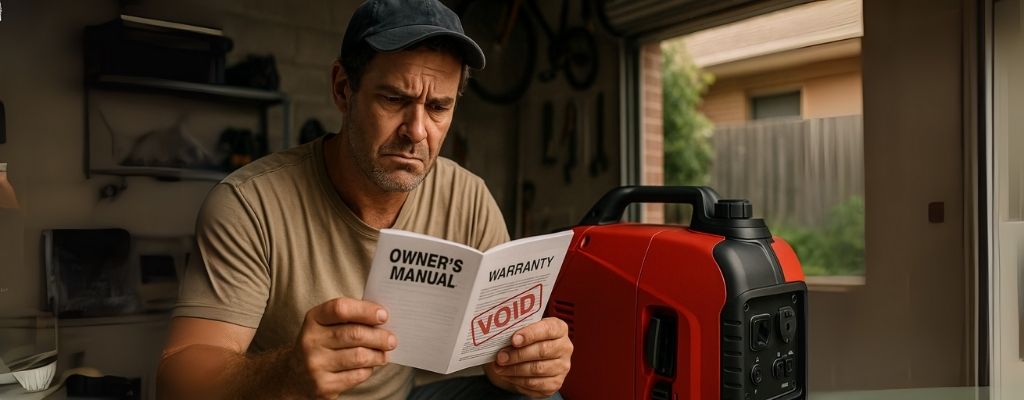
What’s the Warranty on Most Generators?
Ever bought a generator, crossed your fingers, and hoped it’d just work forever? Yeah, nah.
The short answer? Most generator warranties run 2–5 years. But what's covered, what’s not, and what Aussie laws back you up — that’s where it gets interesting.
Keep reading so you’re not left powerless (literally).

Demystifying the Standard Generator Warranty
How Long is a Typical Generator Warranty?
When you buy a generator, the warranty is more than just a nice extra — it’s peace of mind.
Most portable generators come with a 2 to 5-year warranty. Bigger standby units can come with coverage for up to 10 years, depending on the brand.
Industrial generators vary, often based on usage and service plans. Always check what your specific model offers before you commit.
The Difference Between Standby and Portable Generator Warranties
Portable generators usually have shorter warranties, ranging from 2–3 years, ideal for home or recreational use.
Standby generators, often used for emergency or business backup, tend to come with longer coverage — sometimes up to 10 years.
That longer warranty often reflects the expectation of heavier use and higher reliability.
What to Know About Limited vs. Comprehensive Generator Coverage
Not all warranties are created equal.
Limited warranties may only cover certain components or only apply for specific types of failures.
Comprehensive warranties tend to offer full parts and labour over the term.
Read the fine print — some “comprehensive” policies still exclude damage from poor maintenance, natural disasters, or DIY repairs.

What Your Standard Generator Warranty Covers and Excludes
The Essential Components Covered by a Generator Warranty
Most standard warranties will cover the engine and alternator — the guts of the generator.
You’ll also find coverage for the control panel, electrical parts, and fuel system components like filters and pumps.
These are the bits most likely to cause grief, so having them covered is a win.
Common Exclusions in a Standard Generator Warranty
But be warned: normal wear and tear isn’t covered.
If you skip maintenance, use the wrong fuel, or mess with the wiring, the warranty may be void.
Damage from weather events, pests, or improper storage? That’s on you.
Make sure you follow the manual and keep records of services.

The Value of an Extended Generator Warranty
The Benefits of an Extended Generator Service Plan
For those who rely heavily on their generator — say, off-grid setups or busy worksites — an extended warranty can be a lifesaver.
It covers you beyond the standard period, potentially saving hundreds in parts and labour.
Plus, some plans include priority servicing, loan units, or discounted parts.
The Case for an Extended Generator Warranty: Peace of Mind and Financial Protection
An extended plan gives you confidence.
If your generator is mission-critical — say, for medical equipment or commercial use — having that extra protection could save you from costly downtime.
Think of it as insurance: you hope you never need it, but it’s great to have.
Understanding the Cost and Duration of an Extended Generator Warranty
Extended warranties usually last between 1–5 extra years and come at a cost — either as a one-off or annual fee.
Weigh this against the generator’s value and how often you’ll use it.
For low-use home generators, it might be overkill. But for high-demand environments, it’s often worth it.

How to Keep Your Generator Warranty Valid
The Crucial Role of Regular Maintenance for Your Generator
A warranty is only as good as your maintenance.
Neglect regular servicing, and the coverage could be voided before you even need it.
Stick to the maintenance schedule and log all work done, even if it’s a DIY job.
Why Maintenance is the Key to a Valid Generator Warranty
Oil changes, filter replacements, and periodic inspections are all essential.
Manufacturers often specify how often these tasks must be done.
Miss a step? You could be out of luck when something fails.
The Importance of Generator Registration and Service Records
Always register your generator after purchase.
This locks in your warranty and ensures smoother claims if things go wrong.
Keep your receipt, service logs, and any repair invoices.
It’s not glamorous — but it could save you a serious headache later.
You might also like:
-
What Happens If You Don't Ground a Generator?
- Where Are Generators Made?
- Who Repairs Generators?
- Should I Rent or Buy a Generator?
- Are Refurbished Generators Worth Buying?
- Are Generators Eco-Friendly?
- What Are the Zoning Laws for Standby Generators?
- How Do I Prepare a Generator for a Hurricane?
- How Do Sand and Dust Affect Generators?
- What Insurance Considerations Are There for Generators?


